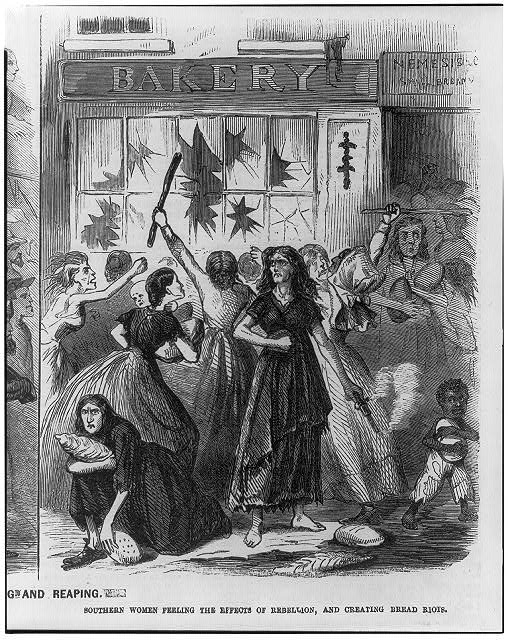The women of Richmond were hungry, and so were their children.
In April 1863, the Civil War had been raging for two years. A hard winter gave way to a reluctant spring, and food was scarce. The war had disrupted planting throughout Virginia, troop movements filled the railways with soldiers rather than grain, and the capital of the Confederacy was full of wounded soldiers who also needed to be be fed. The price of flour had been known to double in a month.
The popular mood darkened more when Jefferson Davis, president of the Confederate States of America, called in late March for a day of fasting to support the troops.
By April 2, Richmond’s housewives had had enough. That morning, hundreds of them stormed Capitol Hill and massed around the governor’s mansion, many of them with clubs, blades and pistols. Virginia Gov. John Letcher failed to calm them and soon the mob was on the move toward the piers of Shockoe Bottom, ransacking food wagons and warehouses along the way.
Though it wasn’t the first Southern bread riot, the angry burst of violence in Richmond rocked the rebels.
“This was a real shock to the upper levels of the Confederate government,” said John Grady, a former editor of the Navy Times who has written about the Civil War. “To see it unfold in the Conferate capital gave them something else to worry about.”
Some of the protesters gathered outside the Confederacy’s White House where Davis looked on. He — or in some accounts Letcher — reportedly said these words to the crowd: “You say you are hungry and have no money; here, this is all I have,” and tossed his pocket change into the throng.
That, too, failed to appease the hungry plunderers.
The tumult spread. Soon, more citizens, men and women, joined in and even non-food stores were looted of linens and millinery, hats apparently being the flat-screen TVs of the day.
“It got pretty ugly,” Grady said.
Richmond Mayor Joseph Mayo read aloud the town’s riot act, and the local militia moved in with loaded muskets and eventually dispersed the crowd. The ringleaders were arrested, many of them women who sold their meager goods at the nearby Second Market.
Some were sentenced to jail, but then pardoned because there was not enough food to keep them them there.
–washingtonpost.com



